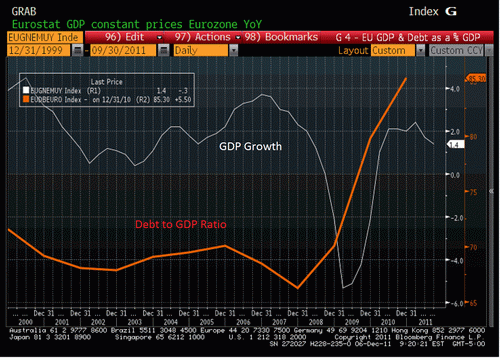Yes, the Germans are concerned that ECB bond buying and direct funding might be inflationary,
but there is something even more fundamental supporting their to objection to ECB support.
The problem is,
the EU leaders believe the high rates, failed auctions, and related funding and liquidity issues
are caused by the national government budget deficits being too high.
And therefore the fundamental solution is deficit reduction.
That is, only by reducing deficits,
will the ability to independently fund return to where it was before the 2008 financial crisis hit.
So while they recognize that ECB funding can keep them muddling through,
though with some perceived inflation risk,
they firmly believe it is deficit reduction that will allow them to return to pre 2008 funding dynamics,
where each member nation could independently fund itself in the market place at reasonable rates.
Unfortunately, that’s a bit like saying that by adjusting his financial ratios,
Bernie Madoff’s fund could return to pre crisis business as usual.
And just like Bernie could only be back in business if somehow he got
the Fed to guarantee his investors against loss,
the way I see it (but, unfortunately, not the way they see it),
the euro member nations now require ECB backing, directly or indirectly,
to be back in business.
As previously discussed, spending and deficits for currency issuers like the US, Japan, UK,
and the euro members when they had their own currencies are not constrained by income or
market forces. Observed debt to GDP levels for currency issuers can be anywhere from
50% to maybe 200%, as they serve to provide the net financial assets demanded by the
various institutional structures of those nations. And regardless of debt ratios, interest rates
are necessarily set by the Central Banks, and not market forces.
Spending and deficits for currency users, including the US states, businesses, households, and the euro member nations since
adopting the euro, are, however, necessarily constrained by income and market forces.
That’s why observed deficits for currency users are far lower than currency issuers.
California, for example, has seen its financing difficulties even though it’s debt to GDP ratio is under 5%.
Luxembourg’s debt to GDP ratio of about 15% when it adopted the euro was by far the lowest of the euro member nations.
And that’s because Luxembourg never did have it’s own currency. It was always a currency user,
and so market forces never let it’s debt get any higher than that. And even with the current financial crisis
Luxembourg’s debt is only about 20% of GDP.
So what happened about 13 lucky years ago is that the currency issuers of mainland Europe decided to turn themselves into currency users.
And at the same time, now as currency users rather than currency issuers,
simply waltz into the euro zone with their suddenly/absurdly too high existing debt ratios they incurred as currency issuers.
The ‘right’ way to do it back then would have been to have the ECB guarantee their debt from the inception of the euro,
and use the Growth and Stability Pact to avoid moral hazard issues and enforce compliance.
But that would not have worked politically.
The only way they would all come together is the way they did all come together.
The priority was union first, and work out subsequent problems as needed.
So now they have two problems-
a solvency problem where they can’t fund themselves without ECB support,
and a bad economy, now further deteriorating as evidenced by negative growth and rising unemployment.
And while the Germans aren’t entirely wrong in their belief that lower deficits would restore funding capacity,
I don’t think they recognize that as currency users debt to GDP ratios may need to be under 30% to get to that point.
Nor do they recognize that given current private sector credit conditions, deficits and debt ratios need to be higher
to offset the demand leakages (unspent income) inherent in their institutional structures. These include pension contributions,
insurance reserves, corporate reserves, individual retirement plans, and the demand for actual cash in circulation.
This means that what they call austerity- pro active tax increases and spending cuts- will slow the economy and therefore cause
tax revenue to fall and transfer payments to rise to the point where deficits increase rather than decrease.
The only remaining hope for growth is exports, but with all the world doing much the same that channel is not currently open.
So back to the present.
(And yes, without the 2008 financial crisis all of this may not yet have happened.
But it all did happen, and here we are.)
The firm belief is that deficit reduction is what is needed to return to independent funding.
And while funding by the ECB can allow things to muddle through, and hopefully not prove inflationary,
there is no exit from ECB funding and the inherent inflation risk it carries apart from deficit reduction.
Therefore I expect the upcoming discussions to focus entirely around deficit reduction, with little if any discussion of funding.
And, as is currently the case, funding assistance will only come conditionally with accelerated austerity.
That is, all options on the table will only cause a bad economy to get worse.
And all options on the table will tend to drive deficits higher,
which both makes matters worse, and,
as recent history has shown,
triggers demands for more austerity.
The chart, below, shows how the financial crisis of 2008 caused what seemed to be working just fine on the way up
to come apart when private sector credit expansion faltered, and the economy took a dive, driving up national government
debt to GDP ratios, and causing it all to go bad in typical ponzi fashion.

